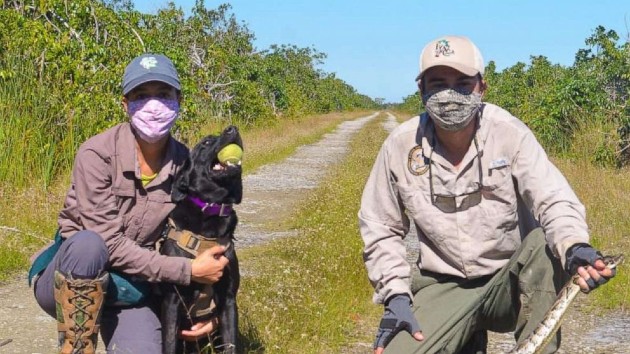 Florida Fish and Wildlife Conservation CommissionBy JON HAWORTH, ABC News
Florida Fish and Wildlife Conservation CommissionBy JON HAWORTH, ABC News
(NEW YORK) — For decades, pythons have been identified as one of the biggest and most concerning invasive species in Florida, having drastically impacted the populations of a number of native species and permanently altering the ecosystem since they were first introduced into the wild.
But now, the Florida Fish and Wildlife Conservation Commission (FWC) have a new weapon in controlling the population of these threats to natural wildlife in the region — Truman the black Labrador and Eleanor the point setter.
Duncan and Eleanor are the two biggest stars of the FWC’s new Detector Dog Team. Their task? Hunting down and helping their handler’s remove Burmese pythons from the wild.
According to the FWC, detector dogs are nothing new and have previously been trained to detect anything from bed bugs to sea turtle nests. Burmese pythons, however, might be the biggest challenge yet.
Truman and Eleanor spent over a month in training and learned to search for pythons using scent signals and how to alert their handlers when they find a python.
“Python-scented towels and live pythons with surgically implanted trackers were used to train the dogs on python scent,” the FWC said in a statement announcing the new detector dog team. “The dogs were also trained to ignore distractions, such as other live animals, when working in an outdoor environment and worked on building up their stamina so they do not tire easily in the field.”
Following their training regimen, Truman and Eleanor now go out five days a week with a handler and an FWC biologist to look for pythons on different public lands across south Florida.
“Pythons compete with native wildlife for food, which includes mammals, birds, and other reptiles,” the United States Geological Survey (USGS) says on their website. “Severe mammal declines in Everglades National Park have been linked to Burmese pythons.”
According to the USGS, a 2012 study found that populations of raccoons had dropped 99.3%, opossums 98.9%, and bobcats 87.5% since 1997.
“Marsh rabbits, cottontail rabbits, and foxes effectively disappeared,” the USGS said. “The mammals that have declined most significantly have been regularly found in the stomachs of Burmese Pythons removed from Everglades National Park and elsewhere in Florida.”
The FWC’s Detector Dog Team is now the newest tool in their arsenal to combat the burgeoning python population across Florida. The work they do, however, can be risky.
“When Truman or Eleanor catches the scent of a python, they follow that scent until they are within approximately 3 feet of the python. When they find a snake, the dogs alert the handler and are rewarded with a recognition response. The dog and handler then back away from the area, clearing the way for the FWC biologist to pinpoint the exact location so they can safely catch and remove the python from the wild,” said the FWC.
In Florida, killing pythons does not require a permit and the invasive species can be humanely killed on private lands at any time with landowner permission and the FWC actually encourages people to remove and kill pythons — except by using traps or firearms — from private lands whenever possible.
For now, however, Duncan and Eleanor are on the job and they didn’t even have to wait long for their first big success.
Said the FWC: “On December 8, 2020 the FWC Detector Dog Team had its first triumph with the successful capture and removal of an 8-foot male python in the Rocky Glades Public Small Game Hunting Area in Miami-Dade County.”
Copyright © 2020, ABC Audio. All rights reserved.

